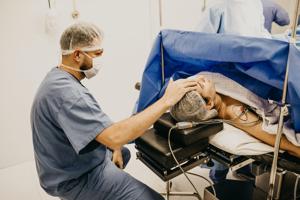Introduction
Navigating the murky waters of medical malpractice can be both daunting and distressing. When a loved one passes away due to what seems like negligence on the part of a healthcare professional, it can leave families heartbroken and confused about their rights. In this comprehensive guide, we'll dive deeply into Understanding Wrongful Death Claims in the Context of Medical Malpractice. We'll unravel the complexities, discuss your rights, and arm you with the knowledge needed to seek justice for your loved one.
Understanding Wrongful Death Claims in the Context of Medical Malpractice
Wrongful death claims arise when someone dies due to another party's negligent or intentional actions. In the medical field, this typically involves situations where healthcare providers fail to meet the standard of care, leading to a fatal outcome. But what does this mean for families seeking recompense?

Medical malpractice occurs when a healthcare provider violates their duty of care toward a patient, resulting in injury or death. This violation could stem from various factors such as misdiagnosis, surgical errors, improper medication administration, or failure to obtain informed consent. When these errors lead to wrongful death, it opens up avenues for legal recourse.
What Constitutes Medical Malpractice?
To fully grasp how wrongful death claims intertwine with medical malpractice, it's crucial to understand what qualifies as malpractice. Here are some key components:
Duty of Care: Healthcare professionals have an obligation to provide care that meets established standards. Breach of Duty: If a provider fails in their duty—perhaps by acting recklessly or incompetently—this constitutes a breach. Causation: There must be clear evidence that the breach caused harm or death. Damages: Finally, there should be quantifiable damages that resulted from this negligence.
The Emotional Impact on Families
Losing a loved one is never easy; however, when that loss is attributed to someone else's negligence, it can compound grief with anger and confusion. Families often grapple with questions like:
- Why did this happen? Could we have prevented it? What are our legal options?
These emotional burdens make understanding wrongful death claims all the more vital.
Types of Medical Malpractice That Can Lead to Wrongful Death
Misdiagnosis and Delayed Diagnosis
When doctors fail to correctly diagnose conditions such as cancer or heart disease in time for effective treatment, the consequences can be dire—often resulting in premature death.
Surgical Errors
Mistakes made during surgery—like operating on the wrong body part or leaving instruments inside—can have fatal outcomes.
Medication Errors
Whether it's prescribing incorrect dosages or failing to recognize dangerous drug interactions, medication errors can easily lead https://www.moseleycollins.com/medical-malpractice-lawyer-in-yelm-wa.html to life-threatening situations.
Failure to Obtain Informed Consent
Patients must understand potential risks before undergoing any treatment. Failing to provide adequate information may lead patients into dangerous situations.
Legal Framework Surrounding Wrongful Death Claims
Statute of Limitations
Every state has its own statute of limitations regarding wrongful death claims arising from medical malpractice. Generally speaking, you may have anywhere from one to three years after the date of death (or discovery) to file your claim.
Who Can File a Claim?
Typically, immediate family members such as spouses, children, or parents may file wrongful death claims. However, laws vary by state; thus it's essential to consult local regulations.
Key Elements Required for a Successful Claim
To build a strong case for wrongful death stemming from medical malpractice:

Calculating Damages in Wrongful Death Claims
Determining compensation in wrongful death cases hinges on various factors:
| Type of Damage | Description | |-------------------------------|---------------------------------------------------| | Economic Damages | Lost wages and financial support | | Non-Economic Damages | Pain and suffering experienced by survivors | | Punitive Damages | Additional fines if gross negligence is proven |
The Role of Expert Witnesses
In many cases involving medical malpractice and wrongful death claims, expert witnesses play an invaluable role. They help interpret complex medical information and clarify whether negligence occurred based on industry standards.
FAQs About Wrongful Death Claims
1. What’s the difference between wrongful death and personal injury?
While both involve negligence leading to harm or loss, personal injury cases involve living individuals who suffered injuries but survived; whereas wrongful death pertains specifically to fatalities resulting from negligence.
2. How long do I have to file a claim?
This varies by state but typically ranges from one year (California) up to three years (New York). Always check local statutes!
3. Can I still file if my loved one signed an informed consent form?
Yes! Even if they signed consent forms acknowledging risks associated with procedures, you may still have grounds for filing if negligence occurred during treatment.
4. Is there an upfront cost for hiring an attorney?
Most personal injury lawyers operate on contingency fees; which means they only get paid if you win your case!
5. What happens during settlement negotiations?
Insurance companies will often try lowball offers initially; however having solid evidence strengthens your negotiating position significantly!

6. Can I sue multiple parties?
Absolutely! If several healthcare providers contributed towards negligence leading up-to-death then each party can share liability within lawsuit proceedings.
Conclusion
Understanding wrongful death claims in the context of medical malpractice is not just about navigating through legal jargon; it’s about seeking justice for those who have been wronged while also providing closure for grieving families left behind. The emotional toll can be overwhelming but arming yourself with knowledge equips you better in pursuing rightful compensation against negligent practices within medicine.
So remember—don’t let fear hold you back! If you believe that someone's negligence led directly towards losing your loved one take action today! Seek legal counsel immediately so that together we navigate this challenging journey towards achieving justice!
In closing—understanding these complex issues empowers victims’ families while holding responsible parties accountable ensuring safer practices henceforth—a legacy worth fighting for don’t you think?